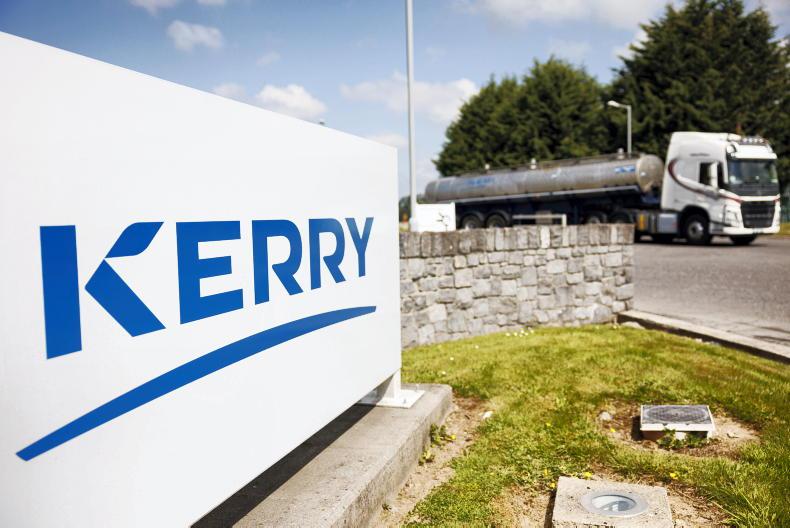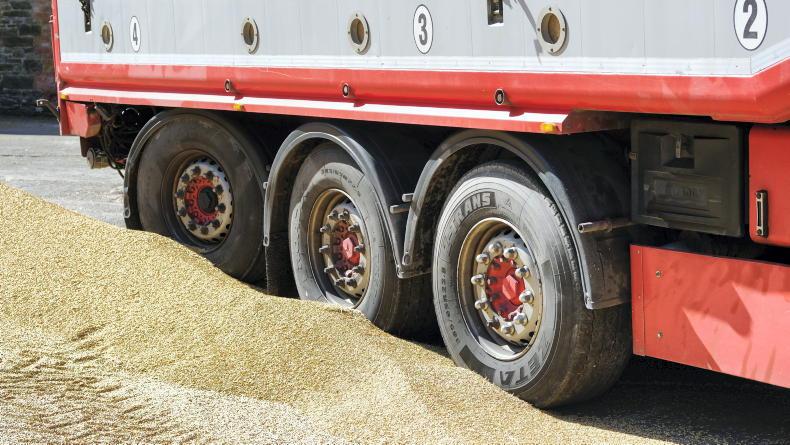DEAR SIR
I am an A ordinary shareholder in Kerry Cooperative Creameries (The Co-Op) Ltd and have been following with great interest media coverage on tax and strategic issues.
I recently received a letter which was issued to A and B shareholders only summarising the tax position in relation to future spin-outs under section 701. There was also a reference to a buyback of some or all of the C shareholders and the tax implications of same which I understand would have significant implications for all categories of shareholders – in particular relating to the value of their shareholding.
I also received a letter that was issued only to A and B shareholders seeking their views on whether the co-op should acquire certain assets from Kerry Group and consider investing in milk processing facilities. These documents were not issued to C shareholders. Given the number of C shareholders in the co-op and the value of their shareholdings, I am amazed that the board has decided not to circulate a copy of the letter to these shareholders.
I have personally spoken to a number of C shareholders who are alarmed that some of their shareholder funds might be utilised without any consultation (not to mention approval) and in a manner which does not reflect their best interests.
As a dairy farmer for over 60 years and a committed and active supporter of the co-op movement in that time, I am familiar with the board’s fiduciary responsibilities to all shareholders and the requirement that they act in the best interests of the co-op. I am now requesting that the board clarify the following matters as a matter of urgency:
1 Can the board explain and justify their decision not to send the tax advice to C shareholders and to exclude them from the consultative process, given that their shares and property rights are the same as other shareholders and given the major financial implications of the board’s proposals on share values?
2 What did the most recent strategy consultation process cost and what was the response rate and outcome of this process? Why was this letter not issued to C shareholders given the implications of these proposals for their share value?
3 In the consultation document the coop seems to have decided to become a milk processor through joint ventures or acquiring processing facilities. What is the position of the Kerry Group on these proposals and what implications do they have for current milk supply contracts in place with Kerry Group and scheduled to run until 2025?
4 Spending money on setting up a new election system including developing software is a further waste of shareholders’ funds, in that the co-op will not be able to get access to milk supplier information due to data protection. The present system is done effectively for free by Kerry management – what is the business case for the current proposals?
5 The board committed to holding a SGM by September 2018 to allow shareholders to decide on rolling out the shares. When will this happen? Could the directors confirm that the board will not try again to convert B shareholders to C, thus removing their right to attend meetings and vote?
6 What corporate governance structures has the board put in place to address perceived shortcomings raised at the 2017 AGM? Is there a budget in place for the operating expenses of the board and what will it cost this year? Annual costs were approximately €600,000 to €700,000 but as the co-op broke away from Kerry Group, it has increased over the last few years to €1m, €1.5m and €2m last year. What has the benefit been to the co-op and the shareholders received from this increased expenditure?
7 Can directors confirm that the co-op board has started another arbitration for 2017/18? Why were farmers not asked to sign up for it this year since the board claimed that it was a necessity for farmers to sign up to benefit from arbitration? In whose name is the arbitration being taken? What are the forecasted costs of this process and what is the timeline for completion?
8 It is five years since the patronage scheme finished and as a consequence there are over 500 dairy farmers who are not members of the co-op. These are farmers who took over family farms or who started dairying on a greenfield site and the co-op board has consistently refused to admit them as members. In a few years the number of milk suppliers who are not members of the co-op will be 25% then it will become one-third and will grow to half of milk suppliers in subsequent years. What does this say about the role of the co-op, its future direction and the co-op’s relevance as the representative body for dairy farmers?
9 How can the co-op justify continuing to exclude up to 500 dairy farmers from co-op membership while simultaneously claiming to represent them? This group was not consulted in relation to the decision to go to arbitration rather than settle the milk price. Is it the board’s position that this group needs to set up a representative body to input into these decisions?
In conclusion, from its foundation, Kerry Co-Op shareholders and Kerry Group have always had a cordial and mutually beneficial business relationship. In recent years, however, this relationship has deteriorated significantly with a major impact on Kerry Co-Op shareholders. This deterioration seems to have largely coincided with recent actions taken by Kerry Co-Op board in pursuit of some new strategic direction.
Given the challenges posed by Brexit and the poor weather of the last 12 months, it is vitally important for all farmers and for Kerry Co-Op that this relationship is repaired and that a clear strategy is communicated to, and agreed by, all shareholders in Kerry Co-Op. Why have we abandoned the Kerry Way?
Read more
Agri shares – stocks fall sharply amid fears of rising interest rates
Kerry holds September milk price
DEAR SIR
I am an A ordinary shareholder in Kerry Cooperative Creameries (The Co-Op) Ltd and have been following with great interest media coverage on tax and strategic issues.
I recently received a letter which was issued to A and B shareholders only summarising the tax position in relation to future spin-outs under section 701. There was also a reference to a buyback of some or all of the C shareholders and the tax implications of same which I understand would have significant implications for all categories of shareholders – in particular relating to the value of their shareholding.
I also received a letter that was issued only to A and B shareholders seeking their views on whether the co-op should acquire certain assets from Kerry Group and consider investing in milk processing facilities. These documents were not issued to C shareholders. Given the number of C shareholders in the co-op and the value of their shareholdings, I am amazed that the board has decided not to circulate a copy of the letter to these shareholders.
I have personally spoken to a number of C shareholders who are alarmed that some of their shareholder funds might be utilised without any consultation (not to mention approval) and in a manner which does not reflect their best interests.
As a dairy farmer for over 60 years and a committed and active supporter of the co-op movement in that time, I am familiar with the board’s fiduciary responsibilities to all shareholders and the requirement that they act in the best interests of the co-op. I am now requesting that the board clarify the following matters as a matter of urgency:
1 Can the board explain and justify their decision not to send the tax advice to C shareholders and to exclude them from the consultative process, given that their shares and property rights are the same as other shareholders and given the major financial implications of the board’s proposals on share values?
2 What did the most recent strategy consultation process cost and what was the response rate and outcome of this process? Why was this letter not issued to C shareholders given the implications of these proposals for their share value?
3 In the consultation document the coop seems to have decided to become a milk processor through joint ventures or acquiring processing facilities. What is the position of the Kerry Group on these proposals and what implications do they have for current milk supply contracts in place with Kerry Group and scheduled to run until 2025?
4 Spending money on setting up a new election system including developing software is a further waste of shareholders’ funds, in that the co-op will not be able to get access to milk supplier information due to data protection. The present system is done effectively for free by Kerry management – what is the business case for the current proposals?
5 The board committed to holding a SGM by September 2018 to allow shareholders to decide on rolling out the shares. When will this happen? Could the directors confirm that the board will not try again to convert B shareholders to C, thus removing their right to attend meetings and vote?
6 What corporate governance structures has the board put in place to address perceived shortcomings raised at the 2017 AGM? Is there a budget in place for the operating expenses of the board and what will it cost this year? Annual costs were approximately €600,000 to €700,000 but as the co-op broke away from Kerry Group, it has increased over the last few years to €1m, €1.5m and €2m last year. What has the benefit been to the co-op and the shareholders received from this increased expenditure?
7 Can directors confirm that the co-op board has started another arbitration for 2017/18? Why were farmers not asked to sign up for it this year since the board claimed that it was a necessity for farmers to sign up to benefit from arbitration? In whose name is the arbitration being taken? What are the forecasted costs of this process and what is the timeline for completion?
8 It is five years since the patronage scheme finished and as a consequence there are over 500 dairy farmers who are not members of the co-op. These are farmers who took over family farms or who started dairying on a greenfield site and the co-op board has consistently refused to admit them as members. In a few years the number of milk suppliers who are not members of the co-op will be 25% then it will become one-third and will grow to half of milk suppliers in subsequent years. What does this say about the role of the co-op, its future direction and the co-op’s relevance as the representative body for dairy farmers?
9 How can the co-op justify continuing to exclude up to 500 dairy farmers from co-op membership while simultaneously claiming to represent them? This group was not consulted in relation to the decision to go to arbitration rather than settle the milk price. Is it the board’s position that this group needs to set up a representative body to input into these decisions?
In conclusion, from its foundation, Kerry Co-Op shareholders and Kerry Group have always had a cordial and mutually beneficial business relationship. In recent years, however, this relationship has deteriorated significantly with a major impact on Kerry Co-Op shareholders. This deterioration seems to have largely coincided with recent actions taken by Kerry Co-Op board in pursuit of some new strategic direction.
Given the challenges posed by Brexit and the poor weather of the last 12 months, it is vitally important for all farmers and for Kerry Co-Op that this relationship is repaired and that a clear strategy is communicated to, and agreed by, all shareholders in Kerry Co-Op. Why have we abandoned the Kerry Way?
Read more
Agri shares – stocks fall sharply amid fears of rising interest rates
Kerry holds September milk price










SHARING OPTIONS